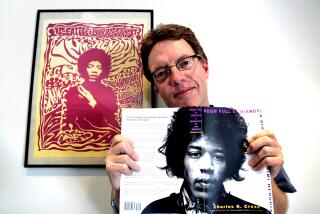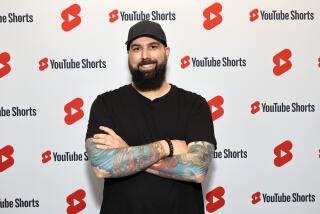Remembering David Bowie through his 100 favorite books
Although David Bowie was best known for his music, he also made countless contributions to the worlds of art, fashion and film.
But the singer, who died Sunday, was also devoted to literature. In 2013, Bowie left the world something other than his groundbreaking albums to remember him by — a list of his 100 favorite books. Bowie’s favorite books list was featured in an exhibit honoring the musician at the Art Gallery of Ontario in Toronto.
Bowie’s list is as eclectic and surprising as he was. He paid tribute to the classics, including Homer’s “Iliad,” F. Scott Fitzgerald’s “The Great Gatsby,” George Orwell’s “1984” and D.H. Lawrence’s “Lady Chatterley’s Lover.”
But he also had a love of contemporary authors. He listed among his favorites Michael Chabon’s “Wonder Boys,” Sarah Waters’ “Fingersmith” and Junot Díaz’s “The Brief Wondrous Life of Oscar Wao.”
Bowie was known for his sense of humor; he had memorable turns as a comic actor in the film “Zoolander” and the television series “Extras.” His book list reveals his love of comedy with novels such as Spike Milligan’s “Puckoon,” Keith Waterhouse’s “Billy Liar,” John Kennedy Toole’s “A Confederacy of Dunces” and Evelyn Waugh’s “Vile Bodies,” which Bowie credited as influencing his song “Aladdin Sane.”
How many of the David Bowie 100 have you read? Join the conversation >>
But he also had a taste for more serious reading, and he gave his imprimatur to books such as Howard Zinn’s “A People’s History of the United States,” Elaine Pagels’ “The Gnostic Gospels” and Julian Jaynes’ “The Origin of Consciousness in the Breakdown of the Bicameral Mind.”
A 1987 poster for libraries featured Bowie in a letterman jacket, holding a copy of Fyodor Dostoevsky’s “The Idiot,” urging American kids to read.
Bowie’s list illustrates his wide range of interests. He selected books about art (Arthur C. Danto’s “Beyond the Brillo Box: The Visual Arts in Post-Historical Perspective”), politics (Christopher Hitchens’ “The Trial of Henry Kissinger”), sexuality (Camille Paglia’s “Sexual Personae: Art and Decadence From Nefertiti to Emily Dickinson” and John Rechy’s classic “City of Night”), the quest for fame (Nathanael West’s “The Day of the Locust”) and, of course, music (Greil Marcus’ “Mystery Train: Images of America in Rock ‘n’ Roll Music”).
The list, which is featured on Bowie’s official website, is preceded by text noting that several people suggested “a Bowie Book Club to tackle each of the 100 volumes.” It would be a fitting tribute to the legendary singer — just as fitting as illustrator Jen Lewis’ sweet, and now heartbreaking, drawing of Bowie as the title character from Antoine de Saint-Exupéry’s “The Little Prince.”
From Bowie’s Facebook page, his complete list of 100 books:
“Interviews With Francis Bacon” by David Sylvester
“Billy Liar” by Keith Waterhouse
“Room at the Top” by John Braine
“On Having No Head” by Douglass Harding
“Kafka was the Rage” by Anatole Broyard
“A Clockwork Orange” by Anthony Burgess
“City of Night” by John Rechy
“The Brief Wondrous Life of Oscar Wao” by Junot Diaz
“Madame Bovary” by Gustave Flaubert
“The Iliad” by Homer
“As I Lay Dying” by William Faulkner
“Tadanori Yokoo” by Tadanori Yokoo
“Berlin Alexanderplatz” by Alfred Döblin
“Inside the Whale and Other Essays” by George Orwell
“Mr. Norris Changes Trains” by Christopher Isherwood
“Halls Dictionary of Subjects and Symbols in Art” by James A. Hall
“David Bomberg” by Richard Cork
“Blast” by Wyndham Lewis
“Passing” by Nella Larson
“Beyond The Brillo Box” by Arthur C. Danto
“The Origin of Consciousness in the Breakdown of the Bicameral Mind” by Julian Jaynes
“In Bluebeard’s Castle” by George Steiner
“Hawksmoor” by Peter Ackroyd
“The Divided Self” by R. D. Laing
“The Stranger” by Albert Camus
“Infants of the Spring” by Wallace Thurman
“The Quest for Christa T” by Christa Wolf
“The Songlines” by Bruce Chatwin
“Nights at the Circus” by Angela Carter
“The Master and Margarita” by Mikhail Bulgakov
“The Prime of Miss Jean Brodie” by Muriel Spark
“Lolita” by Vladimir Nabokov
“Herzog” by Saul Bellow
“Puckoon” by Spike Milligan
“Black Boy” by Richard Wright
“The Great Gatsby” by F. Scott Fitzgerald
“The Sailor Who Fell From Grace With the Sea” by Yukio Mishima
“Darkness at Noon” by Arthur Koestler
“The Waste Land” by T.S. Elliot
“McTeague” by Frank Norris
“Money” by Martin Amis
“The Outsider” by Colin Wilson
“Strange People” by Frank Edwards
“English Journey” by J.B. Priestley
“A Confederacy of Dunces” by John Kennedy Toole
“The Day of the Locust” by Nathanael West
“1984” by George Orwell
“The Life and Times of Little Richard” by Charles White
“Awopbopaloobop Alopbamboom: The Golden Age of Rock” by Nik Cohn
“Mystery Train” by Greil Marcus
“Beano” (comic, ’50s)
“Raw” (comic, ’80s)
“White Noise” by Don DeLillo
“Sweet Soul Music: Rhythm and Blues and the Southern Dream of Freedom” by Peter Guralnick
“Silence: Lectures and Writing” by John Cage
“Writers at Work: The Paris Review Interviews” edited by Malcolm Cowley
“The Sound of the City: The Rise of Rock and Roll” by Charlie Gillete
“Octobriana And The Russian Underground” by Peter Sadecky
“The Street” by Ann Petry
“Wonder Boys” by Michael Chabon
“Last Exit To Brooklyn” By Hubert Selby Jr.
“A People’s History of the United States” by Howard Zinn
“The Age of American Unreason” by Susan Jacoby
“Metropolitan Life” by Fran Lebowitz
“The Coast of Utopia” by Tom Stoppard
“The Bridge” by Hart Crane
“All the Emperor’s Horses” by David Kidd
“Fingersmith” by Sarah Waters
“Earthly Powers” by Anthony Burgess
“The 42nd Parallel” by John Dos Passos
“Tales of Beatnik Glory” by Ed Saunders
“The Bird Artist” by Howard Norman
“Nowhere To Run: The Story Of Soul Music” by Gerri Hirshey
“Before The Deluge” by Otto Friedrich
“Sexual Personae: Art And Decadence From Nefertiti To Emily Dickinson” by Camille Paglia
“The American Way Of Death” by Jessica Mitford
“In Cold Blood” by Truman Capote
“Lady Chatterly’s Lover” by D.H. Lawrence
“Teenage” by Jon Savage
“Vile Bodies” by Evelyn Waugh
“The Hidden Persuaders” by Vance Packard
“The Fire Next Time” by James Baldwin
“Viz” (comic, early ’80s)
“Private Eye” (satirical magazine, ’60s – ’80s)
“Selected Poems by Frank O’Hara
“The Trial Of Henry Kissinger” by Christopher Hitchens
“Flaubert’s Parrot” by Julian Barnes
“Maldoror” by Comte de Lautréamont
“On the Road” by Jack Kerouac
“Mr. Wilson’s Cabinet of Wonders” by Lawrence Weschler
“Zanoni” by Edward Bulwer-Lytton
“Transcendental Magic, Its Doctine and Ritual” by Eliphas Lévi
“The Gnostic Gospels” by Elaine Pagels
“The Leopard” by Giusseppe Di Lampedusa
“Inferno” by Dante Alighieri
“A Grave For A Dolphin” by Alberto Denti di Pirajno
“The Insult” by Rupert Thomson
“In Between The Sheets” by Ian McEwan
“A People’s Tragedy” by Orlando Figes
“Journey Into The Whirlwind” by Eugenia Ginzburg
MORE:
Full coverage: David Bowie’s life and career
Sasha Frere-Jones: An insider’s look at the making of David Bowie’s secretive ‘Blackstar’ album
From the Robert Hilburn archives: David Bowie spends the ‘80s convincing us he’s just a normal guy
More to Read
Sign up for our Book Club newsletter
Get the latest news, events and more from the Los Angeles Times Book Club, and help us get L.A. reading and talking.
You may occasionally receive promotional content from the Los Angeles Times.






